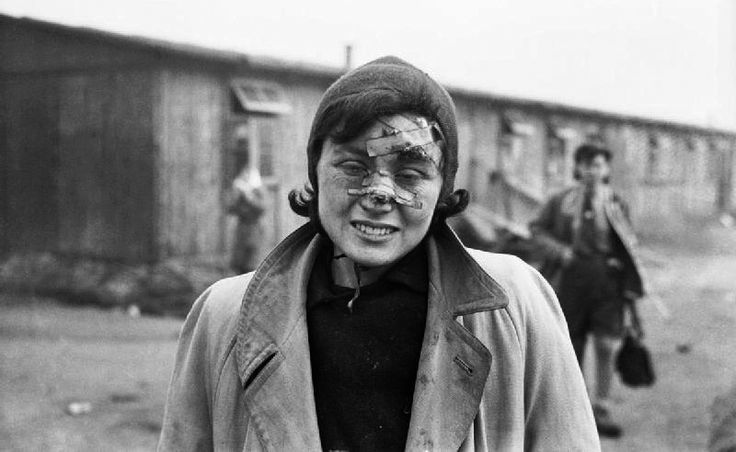
In Odessa, Ukraine, the Nazis begin loading Jews onto railroad cattle cars for removal to the Holta concentration camp to the north. Within 11 days, over 19,500 Jews were murdered there. This woman is an inmate of the Holta camp, according to Pinterest, where this image was posted.
By: Phil Kohn. Dedicated to the memory of his father, GM3 Walter Kohn, U.S. Navy Armed Guard, USNR, and all men and women who have answered the country’s call in time of need. Phil can be contacted at ww2remembered@yahoo.com.
Japanese advances on Borneo continue January 9, meeting little resistance. In the Soviet Union, three Red Army Fronts launch a massive attack north and northwest of Moscow. The Germans put up a fierce resistance, but the Soviets make significant progress. In the Philippines, Japanese troops make their first forays into the Bataan Peninsula. They attack the American-Filipino Abucay Line and meet stiff resistance.
Japan declares war on the Netherlands on January 10. Japanese troops land on Tarakan Island in the Dutch East Indies despite Dutch Martin bombers attacking and harassing the landing craft. Tarakan, located off the northeastern coast of Borneo, houses an oil refinery and four petroleum-loading piers, and is one of the five largest petroleum-processing centers in the East Indies. Gen. Archibald Wavell arrives in Java and activates the ABDA (Australian-British-Dutch-American) Command. Heavyweight boxing champion Joe Louis reports to Camp Upton, in Yaphank, New York (on Long Island, in Suffolk County), where he volunteers to enlist in the U.S. Army as a private.
The Japanese capture Kuala Lumpur, Malaya, the nation’s capital, on January 11. They also launch a full-scale invasion of the Dutch East Indies. In the Pacific, the American aircraft carrier USS Saratoga is torpedoed and severely damaged by Japanese submarine I-6 about 480 miles southwest of Pearl Harbor, Hawaii. In the Atlantic, the British cargo ship SS Cyclops is torpedoed and sunk off Nova Scotia by the German sub U-123. Of the 181 aboard, 87 die. It is the first attack against Allied shipping in the western Atlantic.
On January 12, Commonwealth troops take Sollum, Egypt, on the Libyan border, after a 56-day siege. The German defenders surrender only because they have run out of ammunition. Farther west, Lt. Gen. Erwin Rommel, who has been re-supplied with tanks during his retreat to El Agheila, plans a surprise counterattack against the Allies. To avoid interference from above, Rommel informs neither the German nor the Italian High Commands of his plans. On the Eastern Front, the Red Army launches an offensive to rid the Caucasus of German troops. In Odessa, Ukraine, the Nazis begin loading Jews onto railroad cattle cars for removal to the Holta concentration camp to the north. Within 11 days, over 19,500 Jews are murdered there.
A Red Army counteroffensive in the Moscow area under Gen. Georgy Zhukov takes Kirov and Medya on January 13. In Germany, Vice Adm. Karl Dönitz, commander of submarines, orders German U-boats to operate in waters off the East Coast of the U.S. When they arrive, German captains are astounded to find lighthouses and buoys still lit, no radio silence imposed, and the positions of ships often given away in open radio communications. The result of this laxity: over 150,000 tons of Allied shipping losses in the first month of German U-boat operations in the area. German submarine crews refer to this period as “the American shooting season.” In London, representatives of nine Allied countries sign a declaration stating that, after the war, those guilty of war crimes will be brought to justice.
On January 14, in the North Atlantic, German sub U-43, commanded by Lt. Wolfgang Lüth attacks Allied convoy ON-55 south of Iceland in a severe storm, sinking two ships. Lüth will go on to become the second-most-successful German submarine commander of the war. During his 15 war patrols, U-boats under his command sink 46 Allied merchant ships and one French submarine.
The Japanese invade Burma on January 15. In Malaya, Japanese troops are south of Malacca and clash with Australian forces in heavy fighting at Batu Anam. In Occupied Poland, German authorities begin removing Jews from the ghettoes in Łódź, sending them to the Chełmno extermination camp. The German battleship Tirpitz departs Wilhelmshaven for Norway, where it is to be deployed as a deterrent against an invasion of Norway and from where it can attack Allied convoys to the Soviet Union. In the U.S., President Roosevelt sends a letter to Kenesaw Mountain Landis, the Commissioner of Baseball, requesting that professional baseball games continue to be played during the war. Roosevelt writes: “I honestly feel that it would be best for the country to keep baseball going.” In New York Harbor, German sub U-123 surfaces so close to shore that crewmen on deck can see the rides at Coney Island silhouetted against the evening sky that is lit up by the glow of lights from Manhattan and Brooklyn. Spotted by patrol planes, U-123 quickly dives and makes a successful escape.







